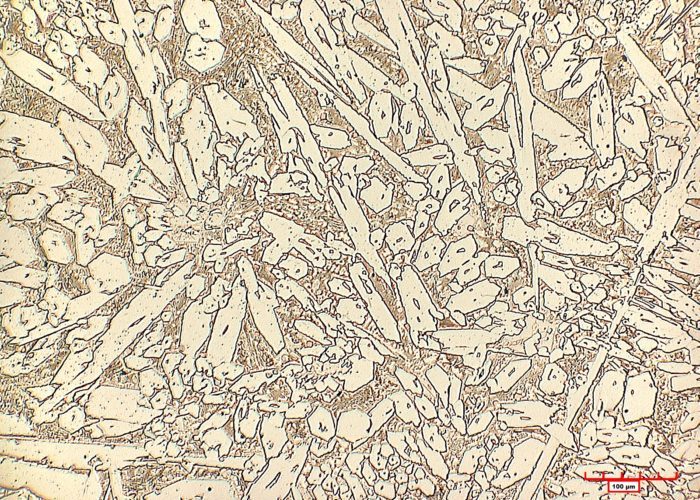


Oil sands producers need to count on their plant equipment to operate without fail in an aggressive operating environment that includes abrasive sands and corrosive chemicals. Without this durability, they face the risk of plant downtime or, worse, environmental leaks.
Working with partners including Vancouver area-based Pacific Particulate Materials (PPM), a world leader in developing high-performance industrial metal alloy powders, InnoTech’s researchers developed an overlay (coating) of chromium carbide, an extremely hard ceramic compound. When the crystals of chromium carbide are fused with metal surfaces, it improves the wear resistance and strength of the metal, even at high temperatures. As an added advantage, the compound can be melted onto metal surfaces, using an innovative plasma arc welding process, to create an extra thick protective layer.
In 2018, engineers from several oil sands majors contacted Gary Fisher about a problem—tiny holes were starting to form on the surface of metal tubing in their upgrading facilities. The InnoTech Alberta researcher quickly offered to help.
“They were looking for an efficient, cost-effective solution to handle the sizeable surface wear on their equipment. One way to do this would be to change the properties of the surface metal,” says Fisher, principal engineer for materials at InnoTech Alberta, a wholly owned subsidiary of Alberta Innovates.
After an initial investigation in early 2018, Fisher realized there was no commercial solution available.
“There was a technological gap. This was something we would have to develop ourselves,” says Fisher, then InnoTech’s team lead of surface engineering, a group of metallurgical engineers and technologists dedicated to developing new protective materials for Alberta’s resource industries.
To get started, over the next few months, Fisher and his team studied industry trends and operating data at the oil sands plants.
“We knew the original nickel-based alloy on their metal tubing provided some corrosion protection. We had to find a way to improve its wear resistance,” explains Fisher, who as an inventor has several U.S. patents for coating technologies.
At the same time, the team shared ideas with partners like Vancouver area-based Pacific Particulate Materials (PPM), a world leader in developing high-performance industrial metal alloy powders.
“There was a lot of technical discussion back and forth, reviewing what we’d learned over the years,” says Wynn Hollingshead, CEO and senior metallurgist at PPM, which has collaborated with InnoTech on various oil sands applications since the 1990s.
From this brainstorming came a realization they could apply an overlay (coating) of chromium carbide. This approach seemed highly promising. Now it was time to put it to the test, starting in mid-2018.
At InnoTech’s laboratory facilities in Edmonton, Fisher’s team created overlay samples, using different chromium-carbide powder blends supplied by PPM. They scanned samples under the microscope to check for quality and to ensure the right chemistry. Then, closely simulating conditions in the field, they exposed the coating surfaces to waves of sand particles to measure abrasion resistance. Through this process of experimentation, the team arrived at the right chromium-carbide combination by the end of 2018.
“By then, we knew this was a composite material that could offer the protection clients were looking for,” Fisher says of the overlay technology, which can be added, as a retrofit or in new construction, to improve equipment protection in a variety of oil sands operations, whether upgrading, thermal production or processing.
In 2020, to carry the application to the next stage, InnoTech transferred the use of the technology to PPM for commercialization.
“At InnoTech, we have a preference for promoting made-in-Canada solutions. PPM, with their world-wide reputation as a Canadian materials innovator, was a strong fit,” Fisher says.
Working with InnoTech, PPM is now further optimizing the chromium-carbide powder blends and plans to begin marketing the product to Alberta’s oil sands sector over the next year.
“There’s a genuine need for this protective overlay technology. Oil sands producers are constantly moving and handling tonnes of abrasive sand. It’s a constant battle to minimize equipment wear. Even incremental improvements like this could have a big impact to their operations,” Hollingshead says.